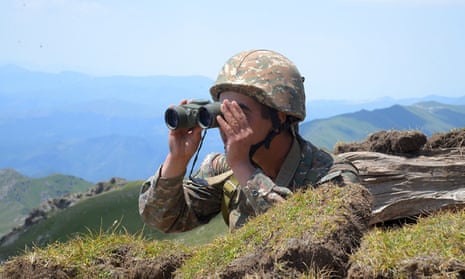At least 16 people, including an army general, have been killed in fighting between Armenia and Azerbaijan forces in the worst outbreak of hostilities in years.
Skirmishes on the volatile border between the two south Caucasus nations began on Sunday. Azerbaijan said it has lost 11 service personnel and one civilian in three days of fighting, and Armenia said four of its troops were killed on Tuesday.
The two neighbours have been locked in conflict over Nagorno-Karabakh, a region of Azerbaijan that has been under the control of ethnic Armenian forces backed by Armenia since a war there ended in 1994. International efforts to settle the conflict have stalled.
Armenian and Azerbaijani forces have frequently engaged in clashes. The current skirmishes appear to mark the most serious spike in hostilities since 2016 when scores were killed in four days of fighting.
The latest incident began when Armenian and Azerbaijani troops exchanged fire in the northern section of their border. Officials in both countries blamed each other for starting the fighting and said sporadic shelling had continued.
Azerbaijan’s defence ministry said two senior officers were killed in fighting on Tuesday along with five other service personnel.
Armenian officials claimed Azerbaijani drones launched an attack on the town of Berd, targeting civilian infrastructure. The defence ministry spokeswoman Shushan Stepanyan said one of the drones was shot down.
Stepanyan also claimed the Azerbaijani military used civilians as shields, placing artillery close to the village of Dondar Gushchu in the Tovuz district about 6 miles from the border.
The Azerbaijani military denied losing a drone and in turn claimed that its forces shot down an Armenian drone and destroyed an Armenian artillery system and its crew.
As hostilities continued, Armenia also accused Azerbaijan of launching cyberattacks on Armenian government websites.
The Armenian prime minister, Nikol Pashinyan, on Monday accused Azerbaijan of provoking the clashes and warned that it would “bear responsibility for the unpredictable consequences”. The Azerbaijani president, Ilham Aliyev, denounced what he described as “another provocation of Armenia” and vowed to protect Azerbaijan’s national territory.
Turkey, which has close ethnic and cultural ties with Azerbaijan, has voiced strong support for its government in the conflict.
The US and Russia, which co-chair the Minsk group of the Organization for Security and Cooperation in Europe that has tried to negotiate a settlement of the conflict, have condemned the violence and called for restraint.
Russia’s foreign minister, Sergey Lavrov, had separate calls with his counterparts in Armenia and Azerbaijan on Monday to call for an immediate ceasefire.
Vladimir Putin’s spokesman, Dmitry Peskov, said Moscow was “deeply worried” about the fighting and stands ready to mediate.
The UN secretary general, António Guterres, also expressed worry. His spokesman, Stéphane Dujarric, said in a statement that the UN chief “urges an immediate end to the fighting and calls on all involved to take immediate steps to de-escalate the situation and refrain from provocative rhetoric”.









